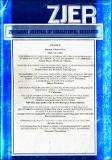| dc.contributor.author | Tondhlana, Saiden | |
| dc.coverage.spatial | Zimbabwe. | en |
| dc.date.accessioned | 2016-02-05T10:41:58Z | |
| dc.date.available | 2016-02-05T10:41:58Z | |
| dc.date.issued | 2010-03 | |
| dc.identifier.citation | Tondhlana, S. (2010) An assessment of teachers' concerns, teachers levels of use and the support they are given in the implementation of the primary school environmental science curriculum in Zimbabwe: a case study of Shurugwi, Zimbabwe Journal of Educational Research, vol. 22, no.1, pp. 34-60. Harare: HRRC. | en |
| dc.identifier.uri | https://opendocs.ids.ac.uk/opendocs/handle/20.500.12413/8890 | |
| dc.description | A ZJER article to evaluate the implementation of the primary school Environmental Science (ES) Curriculum in Zimbabwe with specific reference to Shurugwi district. | en |
| dc.description.abstract | The purpose of the study was to evaluate the implementation of the primary school Environmental Science (ES) Curriculum in Zimbabwe with specific reference to Shurugwi district. It focused specifically on evaluating the extent to which teachers are implementing the curriculum, the concerns of teachers with respect to the ES Curriculum and the support given to teachers in the implementation of the ES curriculum.
The research design used was the survey. Data were collected by means of:
/'. an interview with teachers to ascertain the level at which they were teaching using a branching format (Loucks et al, 1975);
ii. a stages of concern (SoC) questionnaire; and Hi. a questionnaire about support for implementation.
The Regional co-ordinator Better Environmental Science Teaching (BEST) and the education officer (Science) were interviewed using a separate interview schedule. The sample was made up of 60 teachers, 20 heads of schools from twenty schools, the BEST regional co-ordinator and the regional Science Education Officer.
The findings indicated that many heads (60 %) and teachers (62,7% ) had self concerns, with a large number of teachers( 41,7%) being non users; all of the heads (100%) and (38,3%) of the teachers being mechanical users. It was also found that the Ministry of Education, Sport, Arts and Culture and schools were not giving adequate support to teachers implementing the ES curriculum. On the other hand, it was found that ‘ O’level science education and BEST training had a positive effect on teacher use.
The recommendations put forward were that there was need to put in place, large scale strategies such as networks, cadres, radio programmes and teacher magazines, establishing cluster resource centres, providing ‘O' Level science education to those who do not have it and BEST training to those who have not been subjected to it. It would be good for the Ministry of Education, Sport, Arts and Culture to provide sufficient funds for coordinators of BEST so that they can visit schools and advise on problematic aspects of the ES curriculum. | en |
| dc.language.iso | en | en |
| dc.publisher | Human Resource Research Centre (HRRC), University of Zimbabwe (UZ) | en |
| dc.rights.uri | http://creativecommons.org/licenses/by-nc-nd/3.0/ | en |
| dc.subject | Education | en |
| dc.title | An assessment of teachers' concerns, teachers levels of use and the support they are given in the implementation of the primary school environmental science curriculum in Zimbabwe: a case study of Shurugwi | en |
| dc.type | Article | en |
| dc.rights.holder | University of Zimbabwe (UZ) | en |


